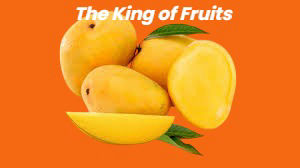Introduction: A Royal Title Well-Deserved
In the vast kingdom of fruits, one stands above all others—the mango, crowned as the “King of Fruits.” With its luscious sweetness, vibrant colors, and rich cultural significance, the mango reigns supreme across continents, captivating taste buds and inspiring legends. From the tropical groves of South Asia to the bustling markets of Latin America, this golden fruit has earned its regal status through unmatched flavor, versatility, and nutritional power.
But what makes the mango truly deserving of its royal title? Let’s explore the history, varieties, health benefits, and global love affair that solidify its place on the throne.
The Mango’s Regal History: A Fruit of Legends
The mango was originally cultivated over 4,000 years ago in the lush forests of India and Myanmar, with ancient texts and folklore honoring its sacred beginnings.
In Hindu mythology, the fruit is linked to the god Ganesha, symbolizing prosperity and eternal love.
Buddhist traditions revere it as a sacred fruit, often depicted in temple carvings.
Mughal emperors planted vast orchards, calling it the “fruit of kings.”
Spanish and Portuguese explorers later carried mangoes to Africa, Brazil, and the Caribbean, where they flourished in tropical climates. Today, India remains the world’s largest mango producer, followed by China, Thailand, and Mexico.
A Kingdom of Varieties: The Mango’s Many Crowns
There is no other fruit with as much variation in taste, texture, and appearance., and appearance. There are over 1,000 mango varieties, each with its own unique charm:
- Alphonso (India)
The “King of Mangoes” within the kingdom
Buttery texture, saffron-colored flesh, and honey-like sweetness
Exported globally, prized for its premium quality
- Ataulfo (Mexico)
Small, golden, and creamy with no fibers
Often called the “Champagne Mango” for its luxurious taste
- Kent (Florida & Peru)
Juicy, fiberless, and perfect for smoothies
A favorite in U.S. supermarkets
- Keitt (Hawaii & California)
Stays green even when ripe
Sweet with a slight tartness, great for salads
- Tommy Atkins (Global Commercial Favorite)
Vibrant red-green skin
Mildly sweet, commonly found in juices and dried snacks
Each variety offers a different experience, proving that the mango’s kingdom is vast and varied.
The Mango’s Golden Health Benefits
Beyond its irresistible taste, the mango wears a crown of health benefits:
- Immunity Booster
One mango contains all of the vitamin C required each day.
Strengthens defenses against infections
- Digestive Health
High in fiber and enzymes (like amylase) that aid digestion
Natural remedy for constipation
- Skin & Hair Elixir
Vitamin A promotes glowing skin
Beta-carotene reduces hair fall
- Heart Protector
Potassium and magnesium regulate blood pressure
Antioxidants lower bad cholesterol
- Cancer-Fighting Properties
Polyphenols (like mangiferin) combat oxidative stress
No wonder ancient Ayurvedic healers called it the “fruit of longevity.”
Global Love Affair: How the World Worships the Mango
From street food to gourmet dishes, the mango’s influence is universal:
- India: Mango Madness
Aamras (mango pulp) with puri – a summer delicacy
Mango lassi, pickles, and chutneys – staples in every home
- Thailand: Sticky Rice & Mango
Khao Niew Mamuang: juicy mango over sweet coconut rice - Mexico: Spicy & Sweet
To prepare mango with chile, slice a mango and sprinkle it with lime juice and chili powder. - Philippines: Green Mango Delight
Sinigang (sour soup) with unripe mango - USA & Europe: Smoothies & Sushi
Mango smoothie bowls, sushi rolls, and cocktails
Even fast-food chains like McDonald’s and Starbucks feature mango in seasonal drinks, proving its global domination.
Threats to the Throne: Climate Change & Commercial Farming
Despite its glory, the mango kingdom faces challenges:
Climate change disrupts flowering seasons, reducing yields
Overuse of pesticides in commercial farming affects quality
Water scarcity in key growing regions (like Maharashtra, India)
Sustainable farming and heirloom variety preservation are crucial to keeping the mango king.
Conclusion: Long Live the King!
The mango isn’t just a fruit—it’s a cultural icon, a nutritional powerhouse, and a global obsession. Its sweetness has conquered palates worldwide, while its history is woven into civilizations.
As we bite into a ripe mango, we don’t just taste its richness—we taste centuries of tradition, nature’s brilliance, and the joy of simple pleasures.
Long live the King of Fruits!

